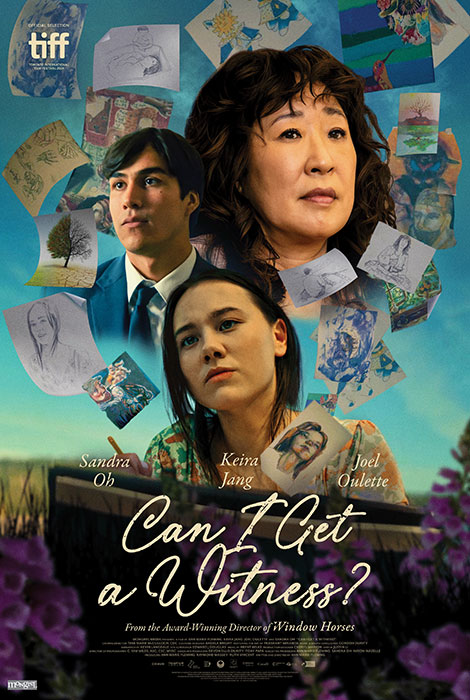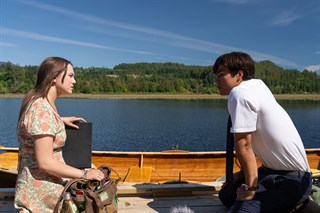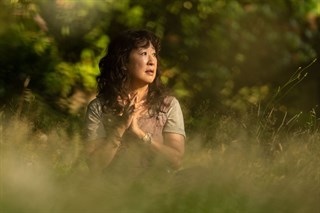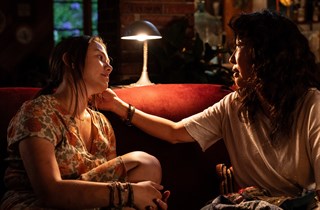‘Can I Get a Witness?’ appraises the price of paradise

“Can I Get a Witness?” (2024 production, 2025 release). Cast: Sandra Oh, Keira Jang, Joel Oulette, Zaa Nkweta, Shaz Far, Casey Kenneth Wright, Yuki Morita, Ben Immanuel, Patrick Gallagher, Naika Toussaint, Andre Anthony, Oscar Chark, Jude Wilson, Cassandra Sawtell, Tedra Rogers, Ally Battaggia, Kymo Van Oers, Jovanna Burke. Director: Ann Marie Fleming. Screenplay: Ann Marie Fleming. Web site. Trailer.
Successfully vanquishing global ills like environmental degradation, economic inequality, insufficient health care and armed conflict in order to purposely create an earthly paradise is undeniably an ambitious and virtuous goal that most of us would probably support. The benefits of creating a healthy, sustainably managed future are undeniable. But how far would we be willing to go to realize it? The cost of not taking any action is undoubtedly a high one, but what if we were to resort to questionably drastic measures to ward off the deleterious effects of social, economic and ecological complacency – would they be worth it? Indeed, could the ends truly justify the means? These are among the profound questions raised in the thoughtful new social science fiction release, “Can I Get a Witness?”
In a world of the near future in which the aforementioned goals are achieved, the planet has been transformed from a world on the brink to one that’s arguably a virtual paradise. This has been made possible by the adoption of principles outlined in the Universal Constitution of Human Rights and Responsibilities. This template for the future of the planet, apparently drafted and agreed upon by governments, corporations and other entities from around the globe, outlines what is required of everyone to maintain this utopian new world. But is it really everything it’s cracked up to be?
Considering that Earth was on the verge of collapse on multiple fronts, the parties behind this aggressive plan of global reorganization and rebirth concurred on the implementation of a series of bold measures to stave off what seemed like an almost-certain point of no return. And, in many regards, this daring blueprint proved to be exceedingly successful. However, in addition to the many laudable reforms that were put into place, an array of debatable principles and practices were implemented that might be looked upon as strong medicine that was a little too potent for its own good, measures comparable to those seen in another release from earlier this year, “The Assessment,” as well as a classic episode of Star Trek: The Next Generation, “Half a Life” (1991).
Some of the more modest measures – such as reduced resource consumption, reliance on non-polluting transportation sources, and practices aimed at conserving energy and water – arguably could be considered sacrifices of sorts, but they’re more realistically characterized as moderate inconveniences or acceptable lifestyle adjustments, not insurmountable hardships that make life unduly intolerable. Then there are the many sweeping initiatives focused on recycling and repurposing, including everything from household goods to articles of clothing, changes that might offend those in design and fashion conscious circles given that many items of everyday living now look like they were plucked from resale shops but that are fundamentally still useful enough to enable daily existence to go on. And those changes might well be generally seen as a small price to pay for a better world.

As a result, social and environmental stewardship and personal sovereignty have unexpectedly come into discreet conflict with one another. On the surface, it would seem that everyone has willingly gone along with these changes. And, when it comes to the more modest measures, that might be true. However, as for turning in one’s life at 50, there’s undeniable pushback. Some individuals are unquestionably vocal about their resistance, but most others have quietly capitulated to this practice, even if their agreement is anything but enthusiastic or sincere. It’s almost as if they have chosen to sit back and nod in concurrence that the emperor’s new outfit is truly stunning.
“Can I Get a Witness?” examines this cultural shift from a variety of angles, exploring its implications from an array of differing perspectives. The story is primarily told from the standpoint of a pair of “witnesses,” individuals charged with documenting compliance by 50-year-olds when their time is up. In an effort to make this mandate more palatable, officials have enabled individuals to choose the specific circumstances under which their lives are to be terminated, including everything from the time and place of death to the rituals associated with their transitions and even the fine points of their ceremonies like the food to be served or the music to be played, with all of the particulars scrupulously chronicled by the witnesses. But, even though everything may be carried out in a seemingly agreeable manner, it still amounts to little more than a form of involuntary suicide. Indeed, lipstick on a pig is still lipstick on a pig.

Given Kiah’s prior lack of experience with incidents like this, she understandably has many questions about them, both practically and philosophically. And, because she’s new to all this, she’s also quite impressionable when it comes to the answers she’s given and the events she witnesses, conditions that often leave her vacillating in her viewpoints. For his part, Daniel is charged with making sure Kiah performs by the book and willingly accepts the party line behind what she’s supposed to do. But then there are the diverse reactions of the clients, which vary from quiet acceptance to profound sadness to outright hostility. Under circumstances like that, it’s easy to see how one might not know what to think or how to respond, and that’s very much the case where Kiah is concerned.
It’s particularly important for Kiah to find clarity about this issue because her mother, Ellie (Sandra Oh), herself a former witness illustrator, is about to turn 50. Kiah is torn in her feelings and doesn’t quite know what to believe about her mom’s impending transition. And, to make matters more complicated, Ellie is also quietly ambiguous in her own feelings. Having once engaged in the work associated with witnessing, she’s well aware of what awaits her. What’s more, having lived through the time before the adoption of the Universal Constitution of Human Rights and Responsibilities, she’s also thoroughly acquainted with what the world was like in that troubled time. Her experience and those conditions made it possible to understand the supposed logic behind the practice of willingly giving up one’s life at age 50. But now, with that fateful final birthday looming, suddenly that youthful idealism she once freely embraced has become harder to live with, not only for herself, but also out of concern for her daughter, whose confusion, misgivings and doubt are written all over her worried and perplexed young face.
Considering what Kiah has been going through in her work and in her feelings about Ellie, it’s understandable how she, too, might not know what to think. Are these seemingly noble sacrifices everything they’re meant to be? Are they really necessary to maintaining robust planetary health and well-being? Do they truly represent the fulfillment of a greater good? Or are they a form of social control that most individuals are afraid to question or revolt against? In the end, everything depends on what one believes, and that’s important considering the role our beliefs play in the manifestation of the existence we experience. Such is the nature of the conscious creation process, the philosophy that makes such outcomes possible. It’s unclear whether the characters in this story have heard of this way of thinking, but, considering the stakes involved, it’s imperative that they and others get a handle on the beliefs required in determining what’s genuinely needed for their own welfare, as well as that of the planet overall.

If the world were to ambitiously embark on implementing the kinds of changes that were made in this version of the planet, the reforms would truly be sweeping, requiring concurrence on an unprecedented global level. That, in itself, would probably strike most of us as a gargantuan (and likely unattainable) task, but, if we could create something that even remotely approximates what’s been accomplished in this story, it would rightfullly be acclaimed as one of mankind’s greatest-ever achievements, something for which we should all give ourselves a big pat on the back. But how do we go about it?
To realize a lofty goal such as this, we would need to begin with our beliefs about what we’re setting out to do, as they provide the foundation for what we manifest. This would require a clear sense of vision, one in which we have an incisive idea of what we want to end up with. And it would have to be one that we all share, given that this is a collaborative co-creation on a truly massive scale, an undeniably bold, supremely detailed conception for a world of our dreams.
In pulling off an undertaking like this, however, we must also be aware of the notion that the devil really is in the details. Indeed, how do we precisely determine the particulars for all of the areas in which we’re seeking to initiate change? Considering how many ventures are involved, coming up with a workable plan for just one of them might seem daunting enough in itself, let alone outlines for all of them. What’s more, how would we come up with a unified set of beliefs that all of us could agree on to make all of this happen? Many might see this as innately impossible. Yet somehow the global population portrayed in this film has managed to tackle and overcome the challenges associated with such an effort, an attainment worthy of praise for what it’s enabled in so many aspects of life. It really is a dream that could be fulfilled if we’re all united and committed to bringing it about.
But, as the rules of this new world reveal, can they all genuinely be characterized as viable solutions? Some of them might be, but then there are others that raise doubt, most notably the 50-year lifespan limit. It begs the question, what good is paradise if it can only be enjoyed for a strictly regulated number of years? That’s apparent in the reactions of many of those whose time is up. Is utopia worth it if someone in good health must voluntarily give it all up just to satisfy a slate of idealistic principles? From what’s depicted here, these beliefs generally don’t jibe, no matter how progressively minded one might like to think he or she is.
Many of us claim that we would like to create a paradise on Earth, but how deeply do we believe it, especially if it means making big sacrifices like those seen here? In fact, how many of us have even given thought to what we might have to give up – even of a lesser degree of sacrifice – to achieve results that represent only a mere fraction of what’s been sought here? In examining those considerations – and the nature of the beliefs we would need to embrace to enable their materialization – we might find we’re not as ready for utopia as we might think.

However, in light of these conditions, this is not to suggest that we should just roll over and give up. There is hope for creating a better world, but we must first realistically ask ourselves, “At what cost?” In doing so, we’re likely to find that certain options simply aren’t acceptable. But that’s where expanding the breadth of our vision – and the beliefs supporting it – comes into play. By thinking outside the box to overcome limitations in our beliefs, we could very well devise solutions that get us what we want without having to accept personally burdensome consequences. And therein lies the beauty of our beliefs – they can make anything possible when examined and employed thoughtfully, thoroughly and inventively. They’re at the core of being able to realize a brave new world, including one that suits us without having to resort to unacceptable measures. After all, what kind of paradise would that be?
Where our present-day world is concerned, many of us have come to believe that we’ve painted ourselves into a corner, and those contentions are admittedly hard to deny. But win-win solutions are possible; we needn’t have to settle for unpalatable trade-offs to make improvements in our lives and world at large. And that’s what this latest offering from writer-director Ann Marie Fleming is urging us to contemplate through her examination of the two sides of a very loaded coin. Are the worldly benefits we seek to achieve worth the cost of abruptly and unceremoniously truncating a life in its prime? Indeed, noble as those outcomes might be, should we unquestioningly accept the dubious means for attaining them? It seems that there should be a place for both sets of considerations to be addressed, and we should look for it before we start heading down a path of questionable social dogma from which it could be difficult to extricate ourselves.
“Can I Get a Witness?” examines these themes through a captivating, deftly nuanced narrative that explores its subjects from a variety of angles, many of which could simultaneously and ironically be seen as both inspired and heretical. The material is clothed in a stunningly gorgeous, skillfully blended palette of vibrant cinematography and inventive complementary animation, backed by an eclectic soundtrack, making for an intriguing mix of brilliantly colored sights and captivating sounds. And this package is topped off with a fine ensemble headlined by yet another stellar performance from Sandra Oh. To be sure, a few sequences are a little stretched out, and some viewers might find the ending a tad abrupt. But, considering everything this release has to say – particularly in its willingness to quietly but courageously raise issues that are seldom discussed on screen – “Can I Get a Witness?” thoughtfully covers ample ground rarely seen, matters that we might all have to face on multiple fronts one way or another someday. The film is available for streaming online.
Even with the best of intentions, it’s still possible to get things “wrong.” Focusing our beliefs on one goal so intently that we lose sight of the implications associated with it can lead to a variety of unexpected side effects. Circumstances like this essentially amount to a case of tunnel vision, of not being able to see the forest for the proverbial trees. And it can be made even worse when we willingly and indiscriminately allow ourselves to go along with the program, to blindly consent to what’s been ordered simply to keep from rocking the boat, even if we’re told that such sacrifices are ultimately for the greater good. Being a dutiful citizen of the Earth doesn’t mean giving up our capacities for autonomy and discernment just because we’re told we must do so. We always have our beliefs available to us to question suspect sanctions that go against our better nature, even if we must make some hard choices to assert ourselves in going against notions that are ultimately counterproductive to the welfare of our existence. The kind of courage and faith in our convictions required to step up and confront what’s being imposed on us is an attribute to be treasured and employed when circumstances warrant. And it’s qualities like that we should truly strive to witness – and to document for all to see.
Copyright © 2025, by Brent Marchant. All rights reserved.



